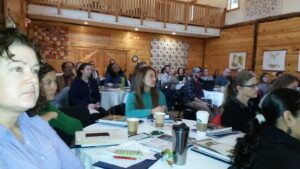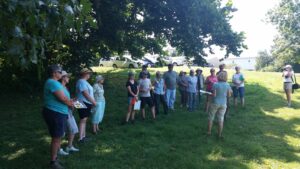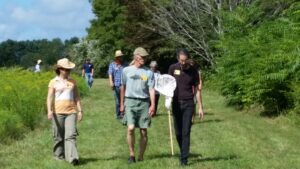2016 Annual Report for ENE15-137
The Conservation Biological Control Short Course
Summary
Wild insects that prey upon crop pests are an overlooked resource. Although vast numbers of such beneficial insects are at work on farms across the world, they are eclipsed in farmer education by a much smaller diversity of pest species. Yet, as a large body of research now demonstrates, farmers as diverse as apple growers, Christmas tree farmers, and soybean producers across the country are already benefiting from natural pest control. Despite this free service, few farmers know much about the beneficial insects around them, and even fewer know how to increase those beneficial insect populations to maximize their pest control potential.
The Conservation Biological Control Short Course synthesizes the latest research on beneficial insects and offers realistic solutions for enhancing beneficial insect populations on farms. Specific course topics include beneficial insect biology, habitat design for beneficials, pesticide risk mitigation, financial support available through USDA conservation programs, and real-world case studies.
This project, the outgrowth of a 6-year research initiative conducted by the Xerces Society and university research partners, for the first time ever presents conservation biological control as an easy-to-adopt framework for multiple crop systems.
The audience for this project includes IPM specialists, Extension personnel, NRCS conservation planners, Soil and Water Conservation District technicians, state departments of agriculture, crop consultants, and sustainable agriculture organizations.
The project is being promoted through multiple channels, as well as in partnership with relevant agencies and state research and extension leaders. Qualitative and quantitative post-course feedback from participants is being used to improve subject matter delivery on an ongoing basis.
Objectives/Performance Targets
Through this 3-year project, 120 educators and farm agency professionals in 12 Northeastern states who participate in the Conservation Biological Control Short Course will teach or advise 480 farmers managing a total of 2,400 acres about recommended conservation biological control strategies including habitat creation or enhancement and pesticide risk mitigation.
Accomplishments/Milestones
To date, the Xerces Society has delivered the Conservation Biocontrol Short Course eight times in six Northeast SARE states. Through this short course, participants are gaining a comprehensive understanding of beneficial insect ecology, native plants to support beneficial insects, the design and installation of habitat features that support those insects, and concepts for balancing the needs of beneficial insects with farm practices. Data from course evaluations indicate that the short course is motivating participants to incorporate conservation practices for beneficial insects into their farmer education work (and in the case of participating farmers, on their own farms). Course participants also demonstrated a strong interest in gaining familiarity with diverse types of beneficial insects and learning about their life cycles.
Partnerships have been an important part of conducting successful short courses. In the Northeast region, we have worked with several partners to organize and present Conservation Biological Control Short Courses including the USDA NRCS, University of Rhode Island, Pennsylvania State University, Hudson Valley Farm Hub, Hawthorne Valley Farmscape Ecology Program, and Cornell Cooperative Extension. Representatives from many of these partnering agencies and organizations have served as guest speakers at recent short courses. Because many of these speakers regularly work in the field providing guidance to landowners or conducting related research, they are able to share practical information with course participants that helps them envision how conservation practices that support beneficial insects will work on their farm.
The 2016 Conservation Biological Control Short Courses in the Northeast were very well received and planning is underway for 2017 courses. Our progress towards Year 1 and Year 2 milestones is described below. Milestones covering the same activities in different time periods are grouped together.
Milestone 1: Audience in first four states receives course announcements; September 2015.
Milestone 6: Audience in next four states receive course announcements; September 2016.
Course announcements for Conservation Biological Control Short Courses were sent out in Massachusetts, New Hampshire, New York, Pennsylvania, Rhode Island, and Vermont in 2015 and 2016.
We are currently planning for the delivery of the short courses in six additional Northeast SARE states for 2017: Connecticut, Delaware, Maine, Maryland, New Jersey, and West Virginia. For the short courses in six states targeted for 2017, these activities are currently underway:
- Identifying potential venues for courses.
- Identifying state contacts and guest speakers for each of the six target states.
- Refining our administrative systems for course promotion and registration.
Announcements for courses in Connecticut, Delaware, Maine, Maryland, New Jersey, and West Virginia will be distributed in the winter and spring of 2017.
Milestone 2: 120 providers attend one of four short courses; 108 indicate intention to change, November 2015–January 2016.
Milestone 7: 120 providers attend one of four short courses; 108 indicate intention to change, November 2016–January 2017.
During the grant period, we conducted eight short courses that were attended by a total of 222 participants, including 41 agricultural support staff and 17 farmers. The primary audiences at all of these events were staff from the USDA NRCS, Soil and Water Conservation Districts, Extension, and sustainable agricultural organizations as well as a number of individual farmers, researchers, crop consultants, botanists, master gardeners, naturalists, beekeepers, and non-governmental conservation organization staff.
Conservation Biological Control Short Courses have been held in the following states: Massachusetts, New Hampshire, New York, Pennsylvania, Rhode Island, and Vermont. Details about courses in each state follow.
Massachusetts
We conducted two short courses in Massachusetts in 2016.
The first Massachusetts course was held on May 5, 2016, at the Bristol County Agricultural School in Dighton, Massachusetts. We had 23 attendees, including five agricultural support staff. We partnered with Bristol County Conservation District staff member Sue Gaducci to host this event. As part of this short course, we conducted an in-depth field-based habitat assessment training. Highlights from this event included a presentation on USDA NRCS conservation program support for habitat from guest speaker Gary Casabona, USDA NRCS State Biologist for Rhode Island.
The second Massachusetts course was held on July 11, 2016, at the New England Wildflower Society, Garden in the Woods in Framingham, Massachusetts. This event had 11 attendees. As part of this short course, we conducted an in-depth field-based habitat assessment training using the Xerces Society’s Beneficial Insect Habitat Assessment Guide. Participants also practiced beneficial and pest insect identification in the field.
New Hampshire
On September 20, 2016, we held a short course at Stonewall Farm in Keene, New Hampshire. We had 28 attendees at this event. Part of this course included an outdoor training in habitat assessment for beneficial insects as well as beneficial insect and wildflower identification.
New York
 Fifty people participated in the New York Conservation Biocontrol Short Course, which featured guest speakers from The Hudson Valley Farm Hub, the Hawthorne Valley Farmscape Ecology Program, Cornell Cooperative Extension and the NY USDA-NRCS. Photo by Kelly Gill, The Xerces Society.
Fifty people participated in the New York Conservation Biocontrol Short Course, which featured guest speakers from The Hudson Valley Farm Hub, the Hawthorne Valley Farmscape Ecology Program, Cornell Cooperative Extension and the NY USDA-NRCS. Photo by Kelly Gill, The Xerces Society.
Our New York course was held on November 9, 2016, at the Ashokan Center in Olivebridge, New York. This course was a close collaborative effort with the Hudson Valley Farm Hub and the Hawthorne Valley Farmscape Ecology Program. We had 50 attendees at this event, including nine agricultural support staff. Highlights for this event included a number of guest speakers presenting on topics related to conservation biocontrol. These guests included:
- Crystal Stewart, CCE Vegetable Specialist
- Jean-Paul Courtens, Hudson Valley Farm Hub
- Conrad Vispo, Hawthorne Valley Farmscape Ecology Program
- Claudia Knab-Vispo, Hawthorne Valley Farmscape Ecology Program
- Elizabeth Marks, USDA NRCS
Pennsylvania
 Participants in the Pennsylvania Conservation Biocontrol Short Course discussed beneficial insects and their habitat associations observed in real-life, field conditions. Photo by Kelly Gill, The Xerces Society.
Participants in the Pennsylvania Conservation Biocontrol Short Course discussed beneficial insects and their habitat associations observed in real-life, field conditions. Photo by Kelly Gill, The Xerces Society.
The Pennsylvania short course was held on September 9, 2016, at the Pennsylvania State University Southeast Agricultural Research Education Center in Landisville, Pennsylvania. We had 26 attendees, including three agricultural support staff. A highlight of this event was the guest presentation by Dr. David Biddinger, an entomologist and professor of tree fruits at Penn State University.
Rhode Island
 Jarrod Fowler, Xerces Society’s Pollinator Conservation and Biocontrol Specialist for the Northeast Region, leads a field tour during the Conservation Biological Control Short Course at the University of Rhode Island East Farm. Photo by Kelly Gill, The Xerces Society.
Jarrod Fowler, Xerces Society’s Pollinator Conservation and Biocontrol Specialist for the Northeast Region, leads a field tour during the Conservation Biological Control Short Course at the University of Rhode Island East Farm. Photo by Kelly Gill, The Xerces Society.
We held two short courses in Rhode Island during 2015 and 2016.
On September 9, 2015, we conducted the first short course at the University of Rhode Island East Farm in Kingston, Rhode Island. Thirty-two people attended, including 14 agricultural support staff. As part of this short course, we conducted an in-depth field-based habitat assessment training. Other highlights included an in-field native wildflower and beneficial insect identification session and a tour of demonstration cover cropping systems that are integrating beneficial insect conservation practices into cover crop management.
The course was very well received, and as a result, the Xerces Society was invited to conduct another short course at the University of Rhode Island in February 2016. The second Rhode Island short course was held on February 11, 2016. We had 40 attendees at this event, including seven agricultural support staff.
Vermont
The Vermont short course was held on June 28, 2016 at Sterling College in Craftsbury Commons, Vermont. This course had 12 attendees, including one USDA NRCS staff member. A valuable component of this course was the outdoor group activities, including habitat assessment training for beneficial insects, and beneficial insect and wildflower identification activities.
Day-of-Course Evaluation Results
In assessing the day-of-course evaluations, 59% (102 out of 172) short course participants completed the day-of-course evaluations where evaluations were collected. For one course, which had 50 participants, evaluation forms were not completed by any attendees; therefore, this course is excluded from this assessment. Of the 102 evaluation respondents, 69% (70 of 102) reported increased knowledge of farm practices to promote beneficial insects, and 83% of participants (85 of 102) reported increased knowledge conducting native plant restoration to improve populations of beneficial insects.
Of the agricultural support staff who responded to the day-of-course evaluation, 63% (26 of 41) said that the Conservation Biological Control Short Course changed how they would advise farmers about farm management practices to support beneficial insects. Of this same group, 56% (23 of 41) said they would incorporate beneficial insect habitat enhancement into existing trainings on federal conservation programs. In total, these agricultural support staff estimated that they interact with 623 farmers annually. Please note that not everyone who indicated that they are agricultural support staff provided additional information regarding their specific affiliation (Extension, NRCS, etc.). In our cumulative milestone table (Cumulative Milestone Table December 2016), we have provided the information as reported.
While the short course specifically targets agricultural support staff, a number of farmers attended each event. Among these farmers, all of them (100%; 17 of 17) indicated that attending the short course changed how they would support beneficial insects on their farms. Similarly, 100% (17 of 17) of responding farmers also said they would take steps to provide additional habitat resources on their farms for beneficial insects, and 35% (6 of 17) reported that they intended to enroll in USDA NRCS conservation programs for beneficial insects. Collectively, these farmers reported that they manage approximately 901 acres of land.
Feedback from short course participants to date has been very positive. Examples of specific comments from this reporting period include:
“I expected to learn about the benefits native insects can provide to farms and public/private lands, and these expectations were absolutely fulfilled!” – Course participant, Kingston, RI short course 2015
“Great information for producers on alternatives besides using pesticides.” – Agricultural support staff, Keene, NH short course 2016
“Many thanks for a great day of excellent useful information. Fantastic speakers. Bravo!” – Course participant, Landisville, PA short course 2016
“Great pace, knowledge and learning atmosphere. Presenter was very engaging and helpful.” – Agricultural support staff, Craftsbury, VT short course 2016
“Great workshop! This could go on for a week!” – USDA NRCS staff, Kingston, RI short course 2016
Milestone 3: 120 providers receive follow-up emails 6 months post workshop reminding them that we are here to help them as they apply course content in their work and that we will be checking in more formally one year after the short course, May 2016—July 2016.
Follow-up emails were sent to short course participants following the course. These emails provided additional resources as well as reminders that we are available for help as they implement the course content.
Milestone 4: 40 providers incorporate content into work with 160 farmers managing at least 800 acres, November 2015–October 2016.
Milestone 9: 40 providers incorporate content into work with 160 farmers managing at least 800 acres, November 2016–October 2017.
In follow-up surveys, we asked agricultural support staff who attended a short course whether they have incorporated course content into their work with farmers, and the number of acres they have affected. As discussed under Milestone 5, the survey period for 2015 short course participants will end in January 2017. However, based on day-of-course evaluations, more than half of evaluation respondents who are agricultural support staff said that they intended to incorporate course content into their support for farmers, and so we are optimistic that they will report having done so.
Milestone 5: 42 providers complete follow-up survey, November 2016–February 2017.
Follow-up surveys were distributed to 32 course participants from the 2015 Rhode Island Conservation Biological Control Short Course in December 2016. The survey period will extend to January 2017 and data will be compiled in February 2017. Surveys will be distributed to 2016 Conservation Biological Control Short Course attendees in 2017.
Collaborators:
IPM Specialist
The Xerces Society
628 NE Broadway, STE 200
Portland, OR 97232
Office Phone: 5032326639
Senior Pollinator Conservation Specialist
The Xerces Society
628 NE Broadway, STE 200
Portland, OR 97232
Office Phone: 5032326639
Pollinator Conservation Specialist
The Xerces Society
628 NE Broadway, STE 200
Portland, OR 97232
Office Phone: (503) 232-6639